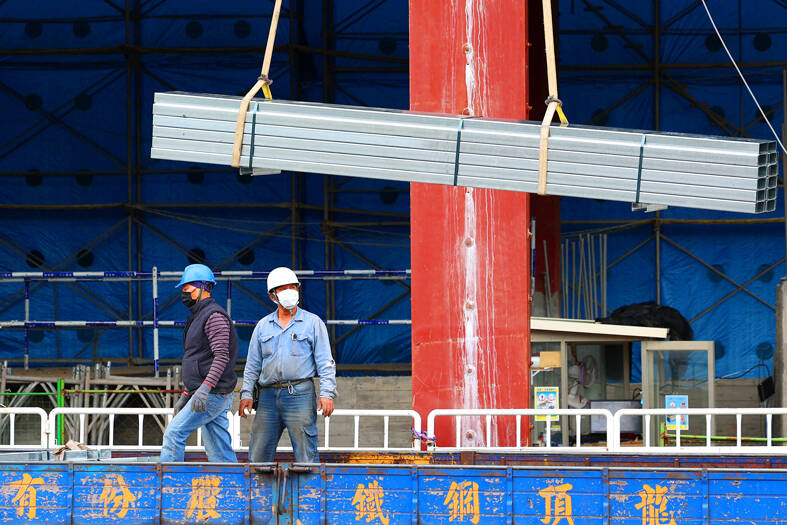Cathay Financial Holding Co (國泰金控) yesterday downgraded its GDP growth forecast for Taiwan for this year to 3.0 percent, from its previous estimate of 3.2 percent, and lowered its forecast to 2.3 percent for next year, down from 2.7 percent, citing slowing export and investment growth.
Other factors that could also weigh on the nation’s growth outlook include Russia’s invasion of Ukraine, China’s COVID-19 situation and inflation in the US and Europe, Cathay Financial Holding said.
Since the global economy is expected to slow next year, demand for manufactured goods from Taiwan might weaken, which would add to the pressure on electronics manufacturers facing inventory congestion and dampen exports momentum, said National Central University economics professor Hsu Chih-chiang (徐之強), who heads a research team commissioned by Cathay Financial Holding.

Photo: CNA
As companies become more conservative about exports and economic growth, they might refrain from expanding or making large-scale investments next year to avoid affecting the scale of private investment, Hsu said.
On a positive note, private consumption might contribute to the economy next year due to increased purchasing and relaxed border controls, he said.
In addition, growth momentum in the second half of next year might be stronger than in the first half, as firms are likely to have depleted their inventories by then, Hsu said.
Cathay Financial Holding’s 2.3 percent GDP growth forecast is lower than the 2.53 percent estimate by the central bank and the 2.75 percent that the Directorate-General of Budget, Accounting and Statistics predicted.
Inflation in Taiwan is expected to peak at about 2.0 percent at the end of first quarter next year and the central bank could stop its rate hikes in the first half of the year, Hsu said.
There is a slim chance that the central bank would lower its policy rates next year, he said.
The policy rates are still at a comparatively low level given the central bank’s mild pace of hikes this year, he added.

MULTIFACETED: A task force has analyzed possible scenarios and created responses to assist domestic industries in dealing with US tariffs, the economics minister said The Executive Yuan is tomorrow to announce countermeasures to US President Donald Trump’s planned reciprocal tariffs, although the details of the plan would not be made public until Monday next week, Minister of Economic Affairs J.W. Kuo (郭智輝) said yesterday. The Cabinet established an economic and trade task force in November last year to deal with US trade and tariff related issues, Kuo told reporters outside the legislature in Taipei. The task force has been analyzing and evaluating all kinds of scenarios to identify suitable responses and determine how best to assist domestic industries in managing the effects of Trump’s tariffs, he

TIGHT-LIPPED: UMC said it had no merger plans at the moment, after Nikkei Asia reported that the firm and GlobalFoundries were considering restarting merger talks United Microelectronics Corp (UMC, 聯電), the world’s No. 4 contract chipmaker, yesterday launched a new US$5 billion 12-inch chip factory in Singapore as part of its latest effort to diversify its manufacturing footprint amid growing geopolitical risks. The new factory, adjacent to UMC’s existing Singapore fab in the Pasir Res Wafer Fab Park, is scheduled to enter volume production next year, utilizing mature 22-nanometer and 28-nanometer process technologies, UMC said in a statement. The company plans to invest US$5 billion during the first phase of the new fab, which would have an installed capacity of 30,000 12-inch wafers per month, it said. The

Taiwan’s official purchasing managers’ index (PMI) last month rose 0.2 percentage points to 54.2, in a second consecutive month of expansion, thanks to front-loading demand intended to avoid potential US tariff hikes, the Chung-Hua Institution for Economic Research (CIER, 中華經濟研究院) said yesterday. While short-term demand appeared robust, uncertainties rose due to US President Donald Trump’s unpredictable trade policy, CIER president Lien Hsien-ming (連賢明) told a news conference in Taipei. Taiwan’s economy this year would be characterized by high-level fluctuations and the volatility would be wilder than most expect, Lien said Demand for electronics, particularly semiconductors, continues to benefit from US technology giants’ effort

‘SWASTICAR’: Tesla CEO Elon Musk’s close association with Donald Trump has prompted opponents to brand him a ‘Nazi’ and resulted in a dramatic drop in sales Demonstrators descended on Tesla Inc dealerships across the US, and in Europe and Canada on Saturday to protest company chief Elon Musk, who has amassed extraordinary power as a top adviser to US President Donald Trump. Waving signs with messages such as “Musk is stealing our money” and “Reclaim our country,” the protests largely took place peacefully following fiery episodes of vandalism on Tesla vehicles, dealerships and other facilities in recent weeks that US officials have denounced as terrorism. Hundreds rallied on Saturday outside the Tesla dealership in Manhattan. Some blasted Musk, the world’s richest man, while others demanded the shuttering of his